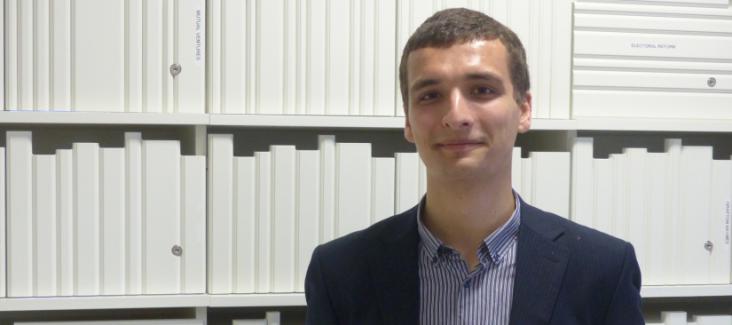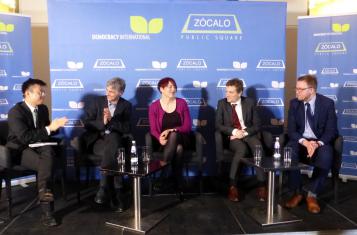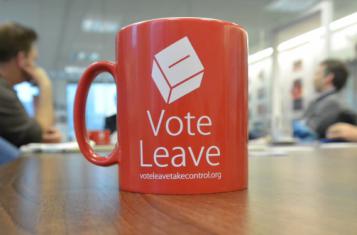Democracy International: There are three months to go until the referendum in the UK on whether to remain or to leave the EU. How visible is the campaign? How, where do you notice that the UK is facing this crucial vote on 23 June?
Josiah Mortimer: The most poignant and concerning thing so far is how personality-focused the campaign has been. So while it has been prominent in the national debate, this has largely been confined to personality politics - particularly David Cameron vs Boris Johnson and the internal disputes of the Conservative Party, and to an extent the Labour Party.
Just 16% of people say they feel well-informed about the debate, so the real issues simply aren't getting through, and the public feel alienated by what is at risk of being a Westminster-bubble conversation.
In your opinion, what is the biggest challenge of the referendum campaign?
The biggest challenge is creating a grassroots debate that genuinely engages the public. There's currently nowhere to get all the facts and the main arguments on both sides, and then to debate them. The Electoral Reform Society will be setting up an online democratic tool to do this - and to help people organise local events to discuss the referendum - as it's something that is desperately needed.
In view of these issues, how does an ideal campaign look like? What is “a fair and democratic debate” for you?
There are five main ideas: firstly, both the Remain and Leave campaigns should commit to taking part in televised debates on the EU referendum. Secondly, the campaigns should make voter registration a key plan. Currently around 15 per cent of all eligible citizens are not registered to vote – and the proportion is even higher for young voters.
The third idea is to make the campaigns commit to a ‘Ceasefire Week’, where both sides only put out the positive cases for their arguments. Citizens should also have a chance to debate the issues with speakers of the campaign at local level. And finally, media organisations, relevant public bodies and non-governmental organisations should commit to providing balanced coverage of the debate, including clear and comprehensible facts on Britain’s relationship with the EU.
The referendum is a consequence of the fact that Cameron had promised to hold a referendum in case of being re-elected in the general elections in May 2015. Cameron subsequently negotiated special commitments for UK’s relationship with the EU in the so-called “new settlement”. From a democratic perspective, how do you judge Cameron’s political behaviour?
There was no democratic input from the public in terms of what the deal would entail. Running a 'citizens' assembly' to determine how the public would like to see the EU reformed would have been a good start. The deal was almost entirely confined to economic issues, whereas crucial democratic issues were ignored.
The Electoral Reform Society you work with campaigns “for a better democracy” as you publicly announce on your website. How should the UK become more democratic? What does the Electoral Reform Society concretely demand?
There are a wide range of reforms we need to bring British democracy into the 21st century.
Westminster's First Past the Post voting system - a winner-takes-all system that creates huge numbers of wasted votes and massively disproportionate election results - is woefully out of date. We need a proportional voting system that puts the voter at the centre. Most of Europe use proportional systems, as do the Assemblies and Parliaments of Wales, Scotland and Northern Ireland. The last general election was the most disproportionate in British history - seats simply did not match people's votes - and there is a clear and growing appetite for change.
We also need an elected House of Lords - currently it is almost entirely appointed by the Prime Minister, and is increasingly made up of party donors, former party staffers and defeated politicians. And we need things like votes at 16 to get young people involved in politics, a system of automatic voter registration, and major reform to the party funding system – currently big donors dominate our politics.
Under the slogan “Stand up for a democratic Europe now” Democracy International is currently campaigning for real democracy at EU level (see here). We demand a European Convention according to Article 48 of the Lisbon Treaty, to discuss a democratic reform of the EU and to establish a new Treaty or Constitution for Europe. Do you support our idea of an EU Convention? Does the Electoral Reform Society also pursue more democracy at EU level? What are your demands?
We support all attempts to get citizens across the UK and Europe more involved in their democracy. In terms of how the EU could be reformed and what a democratic deal might look like for if Britain votes to stay in, there is a lot that can be done by the UK on its own to democratise its relations with the EU.
Overall, we would like to see a smaller, more transparent Commission, and an end to the decampment of the European Parliament to Strasbourg, among other reforms to bring British voters closer to EU democracy if Britain votes to remain - something we are neutral on.
On the referendum on 23 June, what will happen after the vote in case of a vote to remain or to leave the EU? What needs to be done from a democratic perspective in case of both scenarios?
If Britain does vote to leave the EU, it will have no say over the trade rules we will need to comply with in order to conduct our business with Europe, so this will be a major issue. The question is how Britain outside Europe can ensure that citizens and their elected government have real influence over these issues. And there are democratic questions about Wales, Scotland or Northern Ireland. If they vote to stay in the UK but England votes to leave, should England’s votes pull Wales or other devolved nations out of the European Union?
Moreover, if we leave the EU there will need to be a constitutional convention of citizens to look at how we move forward as a democracy, after what will be a huge political change. We’ll also need to ensure citizens have some say on whatever treaties or trade relationships we sign up to.
In the meantime, we’ll be campaigning to improve the quality of the EU debate in the UK, through polling, a new democratic online tool, events, and media/campaign work.
Josiah Mortimer is the Communication Officer for the Electoral Reform Society, an independent campaigning organisation working to champion the rights of voters and build a better democracy in Britain. Find out more about the ERS’ plans for ‘A Better Referendum’ here.
Follow Josiah Mortimer on Twitter: @josiahmortimer, and the Electoral Reform Society @electoralreform
Interview by Cora Pfafferott



